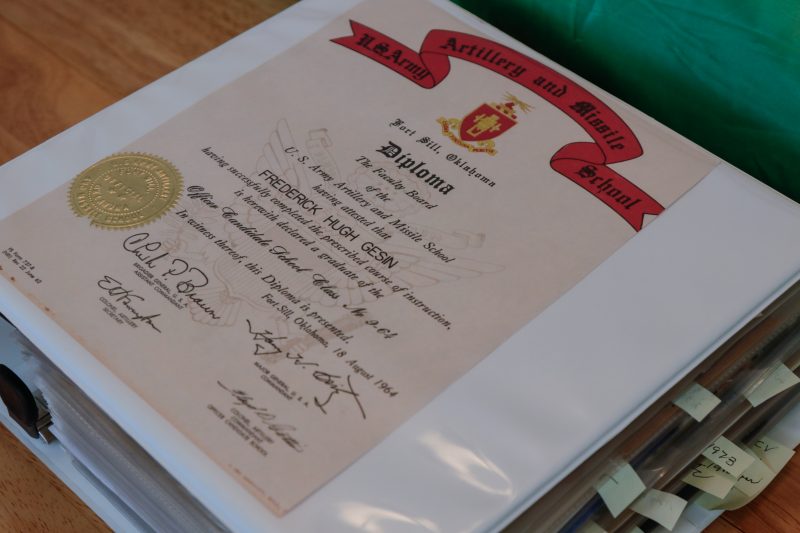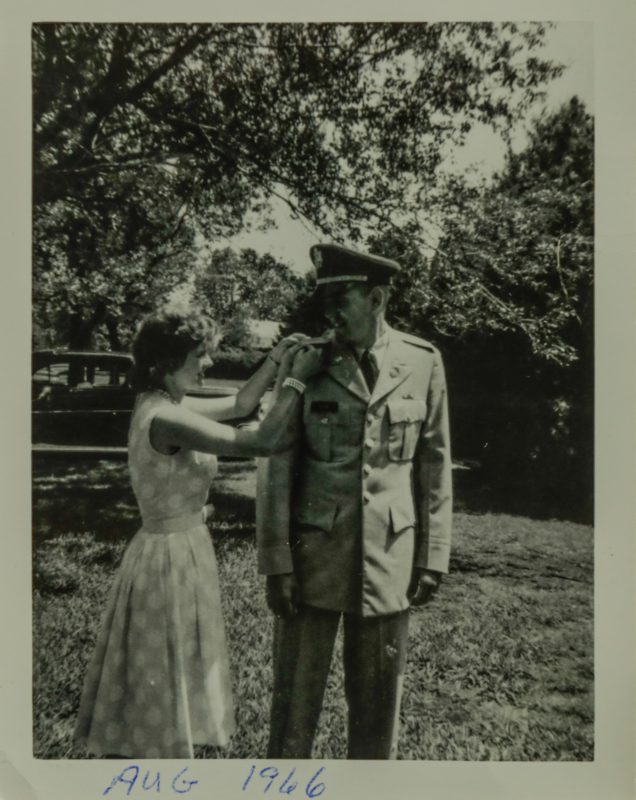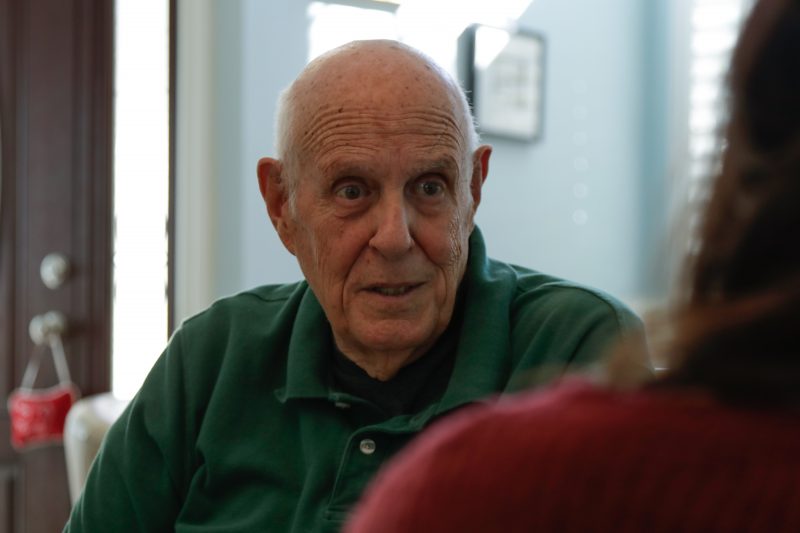Though not many can say their entire career was a good one, Fred Gesin certainly can.
“For a 44-year career of working, nobody has had a better experience than I’ve had,” he said proudly. “I had 20 wonderful years in the Army, and most of it was because of my mouth.”
Anybody needed to be briefed? Gesin would do it.
Retirement ceremony announcer? Gesin would do it.
A visitor needed an escort? Gesin would do it.
Gesin used his mouth and his positive attitude to propel him in his career, and he succeeded, receiving 10 promotions in his 20 years in the service.
Early life
Gesin was born on June 24, 1939, in Tahlequah, Oklahoma. He was an only child and “spoiled rotten.”
His family moved to Broken Arrow in 1947. “My dad was the history teacher, the driver training teacher, the band director and the assistant principal at the high school — and he was mayor of the city.
“He got a salary — he could park in the penny and nickel parking meters for free,” Gesin added, chuckling.
Gesin started playing drums in the third grade and took lessons every week, all the way through high school. “I was lucky.”

He described Broken Arrow, a town of no more than 3,000 people at the time, as a wonderful place to grow up as he was able to play outside with his friends each day until the siren went off at 5 p.m., which meant it was time to come home for dinner.
Though his father drove to school every day, Gesin was allowed to walk the mile-and-a-half with his friends, unless it rained or snowed, then his father would pack them all in his car.
“We had the biggest graduating (class) in the history of the school — 112,” he said.
When starting college, Gesin decided to study geophysics as his grandfather worked in the oil business. “Geophysicists used dynamite and blew things up, and it sounded like fun.”
Though a geophysics major, during his first two years, he attended first Northeastern University, then the University of Oklahoma with music scholarships, and played in various bands.
He quickly decided geophysics wasn’t for him after being faced with his first calculus class, so he switched to a psychology major so he could still graduate quickly, and met his future wife, Janet, when back at Northeastern.
“It took me five and a half years to get that four-year degree,” he said. “I’m the only psychology major that you know with a second minor in math, chem, physics and geology.”
Once he graduated, his student deferment for the draft was no longer going to be valid, so he went down to the draft board to figure out what his options were, ultimately deciding to join the Army.
Military life
Gesin had done two years of mandatory ROTC while in college, so when they sent him to Fort Leonard Wood, Missouri, for basic training in July 1962, he was ready. “It was horrible, but I was prepared for it.”
Because of his ROTC experience, he was chosen as the “acting corporal” of his fellow recruits. “And I, for some reason, was selected as one of the top 10 graduates of our class of 800, so that was kinda neat.”

He was then sent to the Army Security Agency at Arlington Hall Station in Virginia and was told he’d be the command sergeant major’s clerk at headquarters.
“He gave me the best advice I ever received in my 44 years of working,” Gesin said, adding that he told Gesin, “‘Don’t ever ask me a question about how to do your job.’ I was just totally confused.”
The sergeant major then instructed Gesin to read the regulations, which “answers every question you could have,” before coming to talk to him. “‘If you got the answer right, I’ll tell you. If you didn’t get it right, I’ll show you how to do it. But I’m not going to do your job for you,’” he told Gesin.
Though Gesin started as a clerk typist, he quickly began climbing the ranks. Janet soon met him in Virginia and they got married in June 1963.
After two years, Gesin had been promoted to specialist and though he only had a year left in his enlistment, he was sent to artillery and missile Officer Candidate School in Fort Sill, Oklahoma, to avoid going to Korea for a year without Janet.
“Everybody that graduates from artillery OCS is (typically) commissioned artillery — I wasn’t. I was commissioned military intelligence,” Gesin said, adding that it was the command sergeant major who had made that happen.
In January 1965, he was sent to Berlin, Germany, for three years, collecting intelligence.
“It was a real neat assignment because you could drive around and could never get lost because you were walled in West Berlin,” he said. “We were in Andrews (Barracks), which was the Officer Candidate School for Hitler’s SS.”
Gesin once went down to a field that had a parapet early in the morning and had an eerie experience. “I put my hand on the front of that parapet, and I said, ‘I’m standing in the footprints of Hitler, where he commanded his troops.’ And what a feeling that was to know you stood where Hitler stood.”
He spent his first year assigned to intelligence, supply and admin. “Then I took over the operations company, and as a first lieutenant, I had command of 526 people. It was wonderful. I was so lucky.”

After his tour was over, he returned to Arlington Hall, this time to the Inspector General’s office, working directly for the two-star general. It was only a few months later that he received orders to Vietnam, where he was put in command of an interrogation company.
“I had the best tour anybody’s ever had in Vietnam,” Gesin said. “I had a platoon in each corps… so I traveled all over Vietnam every month visiting my people.”
During that time, Gesin met a Viet Cong colonel who had defected via the Chiêu Hồi Program because his wife was sick.
“I spent 10 days with him 24 hours a day, seven days a week,” he said. “There’s a thing in the Army called a ‘spot report’ that when you send it in, it goes directly to chief of staff, the Army and the White House. I sent 17 spot reports from the information I got from him.”
Gesin came back after a year with two Bronze Stars and was sent to the military intelligence career course, assigned to the Defense Intelligence Agency for the first joint military services school that all four branches went to.
From there, he went directly to Oklahoma State University for a master’s in education with a specialty in counseling psychology.
After graduating, Gesin was sent to be the academic counselor at the Army Intelligence School at Fort Devens, Massachusetts, reporting to the director of education, who was a GS-15. He spent three years there before being given orders for an unaccompanied tour to Turkey.

“I was the operations officer in command of about 1,156 people, but I had Air Force and I had Navy,” he said, adding that it was because of the joint DIA school he’d attended that he was able to do this.
About halfway through the tour, Gesin was awakened in the middle of the night and told a Turkish colonel wanted to talk to him. “He said, ‘Please take down the American flag. This is now a Turkish base.’”
In 1975, the U.S. had cut off aid to Turkey, so the Turkish military took command of all U.S. Army bases. “So, my last five months we did nothing.”
To pass the time, he spent those last few months teaching. “Every soldier took one college course in psychology in that five months.”
Once back, Gesin was first sent to Fort Monroe, Virginia, assigned as the senior military intelligence officer responsible for all Army MI schools, then to Arizona State University as the professor of military science for Army ROTC.
For his last tour, he was reassigned to Army recruiting command as an inspector general, investigating recruiters, which he thought was a fun way to end his career.
After 20 years in the service, Gesin retired as a lieutenant colonel in August 1982.
“I worked for the four ‘A’ agencies: Army Security Agency, Defense Intelligence Agency, National Security Agency and Central Intelligence Agency, because I stayed in military intelligence my whole 20 years,” he said proudly.
Post-military life
After a short stint at a security guard company, Gesin went to work as the director of Department of Defense security programs for Motorola Government Electronics Group in Scottsdale, Arizona, and spent the next 20 years with them before retiring for the second time in 2003.
“Then I got a call from the government’s Defense Investigative Service who said, ‘We’re recalling you to active duty … We need your help,’” Gesin said.

Orbital Sciences Corp., a company that built satellites and launch vehicles, was about to lose their top-secret clearance, so back to work Gesin went as the corporate director of DOD security programs.
“The joke in the Army was on every tour, you want to replace the guy who was relieved because you can do nothing but better,” he said. “So, I started in to do anything I wanted done.”
After finally retiring for good in February 2006, Gesin and Janet moved to Santa Clarita to be closer to their two sons, daughter-in-law and two granddaughters.
Since then, Gesin has volunteered at the Veteran Center in Newhall and at the Santa Clarita Valley Sheriff’s Station since 2010.
“I did patrol for eight years,” he added. “We were authorized to write citations for any non-moving violation. Then, we do vacation checks. We do 360 (degree) checks (around people’s homes), we record it and leave a big yellow tag in their garage door — and it’s free.”
Recently, he and Janet also visited the SCV Senior Center at Bella Vida for the first time, “and just loved it,” Gesin said.
After meeting Robin Clough, coordinator of volunteers, events and advocacy at the center, Gesin broached the idea to have a few tables set aside at coffee every day for veterans, so they can get together. “And they thought that was a great idea.”
Soon, Gesin was on the board of the center’s Veterans Committee and helping to plan the center’s Veterans Day Ceremony, which he was instrumental in making happen, according to Keith Curry, chairman of the committee.










